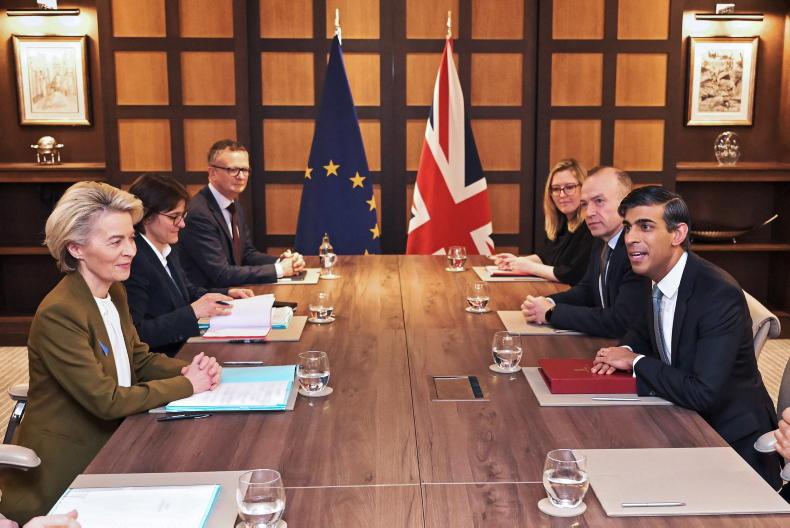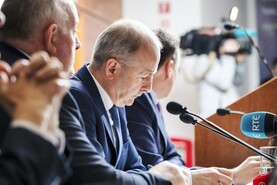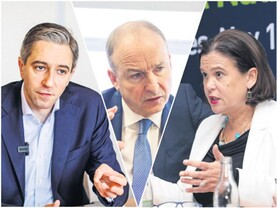While the counting is all that remains in the European Parliament and council elections in Ireland, the general election campaign is getting into full swing in the UK.
The opinion polls suggest that there will be a change of government after 14 years of Conservative Party rule, but there is still a long campaign ahead until voting on 4 July.
It is a very different environment to the 2019 campaign, with a global pandemic, a Russian invasion in Ukraine and conflict in the middle east dictating the work programme of the outgoing government and all featuring in the ongoing campaign.
Get Brexit done
The domestic economy is being thoroughly debated, but, so far, Brexit has hardly been mentioned.
In the previous election campaign in 2019, it was the biggest single issue, with “Get Brexit Done” the winning slogan for the election of then-prime minister Boris Johnson.
While he achieved that and the UK left the EU single market on 1 January 2021, he was forced to resign in the aftermath of issues around COVID-19 and his successor Liz Truss became the shortest-serving UK prime minister in history, lasting just 15 chaotic days.
Rishi Sunak is the outgoing prime minister and his challenger for the office is Sir Keir Starmer, who leads the opposition Labour Party.

UK Prime Minister Rishi Sunak and European Commission president Ursula von der Leyen when they met to finalise the Windsor Framework Agreement. A Labour prime minister would be expected to have a closer relationship with the EU, but there is no suggestion of rejoining.
They had their first TV debate this week and what was striking about it and the campaign in general so far is that not only is Brexit not an issue, neither party wants to mention it, though for different reasons.
Immigration
For the outgoing government, despite being out of the EU over three years, the immigration issue remains no closer to being solved and numbers are higher now than they were before the referendum in 2016.
For the Labour Party, many of their traditional voters in industrial cities were supporters of Brexit and “taking back control” and bought into the 'Get Brexit Done' slogan in 2019.
If opinion polls follows through into voting on 4 July, these voters and many more are set to return to voting Labour. Nurturing this vote has made Labour nervous about any reference to Brexit and the issue is avoided if at all possible.
It is the same with the Conservative Party. Despite having delivered Brexit, the party is no longer claiming it as a major prize, because, in general, public opinion doesn’t perceive that it has delivered any meaningful benefit, particularly with reducing immigration.
Therefore, both parties are avoiding the subject altogether, as it is no longer seen as a vote winner, but, handled wrongly, could be a vote loser for either party.
Certainly, Labour is no longer advocating a return to the EU or even membership of the single market. However, it is generally perceived as less hostile to the EU and has stated a willingness to participate in a veterinary agreement.
That in itself would solve most of the problems for trade with Northern Ireland and suggests that Labour in power might be more inclined to explore a closer relationship with the EU.
The trick will be to achieve as much of the single market benefits as possible, but outside the EU rules and regulations - a more subtle form of having your cake and eating it.
Read more
Farmers won’t decide UK election
Pragmatism governs UK border checks
Sheep and beef worst hit by UK trade deals
While the counting is all that remains in the European Parliament and council elections in Ireland, the general election campaign is getting into full swing in the UK.
The opinion polls suggest that there will be a change of government after 14 years of Conservative Party rule, but there is still a long campaign ahead until voting on 4 July.
It is a very different environment to the 2019 campaign, with a global pandemic, a Russian invasion in Ukraine and conflict in the middle east dictating the work programme of the outgoing government and all featuring in the ongoing campaign.
Get Brexit done
The domestic economy is being thoroughly debated, but, so far, Brexit has hardly been mentioned.
In the previous election campaign in 2019, it was the biggest single issue, with “Get Brexit Done” the winning slogan for the election of then-prime minister Boris Johnson.
While he achieved that and the UK left the EU single market on 1 January 2021, he was forced to resign in the aftermath of issues around COVID-19 and his successor Liz Truss became the shortest-serving UK prime minister in history, lasting just 15 chaotic days.
Rishi Sunak is the outgoing prime minister and his challenger for the office is Sir Keir Starmer, who leads the opposition Labour Party.

UK Prime Minister Rishi Sunak and European Commission president Ursula von der Leyen when they met to finalise the Windsor Framework Agreement. A Labour prime minister would be expected to have a closer relationship with the EU, but there is no suggestion of rejoining.
They had their first TV debate this week and what was striking about it and the campaign in general so far is that not only is Brexit not an issue, neither party wants to mention it, though for different reasons.
Immigration
For the outgoing government, despite being out of the EU over three years, the immigration issue remains no closer to being solved and numbers are higher now than they were before the referendum in 2016.
For the Labour Party, many of their traditional voters in industrial cities were supporters of Brexit and “taking back control” and bought into the 'Get Brexit Done' slogan in 2019.
If opinion polls follows through into voting on 4 July, these voters and many more are set to return to voting Labour. Nurturing this vote has made Labour nervous about any reference to Brexit and the issue is avoided if at all possible.
It is the same with the Conservative Party. Despite having delivered Brexit, the party is no longer claiming it as a major prize, because, in general, public opinion doesn’t perceive that it has delivered any meaningful benefit, particularly with reducing immigration.
Therefore, both parties are avoiding the subject altogether, as it is no longer seen as a vote winner, but, handled wrongly, could be a vote loser for either party.
Certainly, Labour is no longer advocating a return to the EU or even membership of the single market. However, it is generally perceived as less hostile to the EU and has stated a willingness to participate in a veterinary agreement.
That in itself would solve most of the problems for trade with Northern Ireland and suggests that Labour in power might be more inclined to explore a closer relationship with the EU.
The trick will be to achieve as much of the single market benefits as possible, but outside the EU rules and regulations - a more subtle form of having your cake and eating it.
Read more
Farmers won’t decide UK election
Pragmatism governs UK border checks
Sheep and beef worst hit by UK trade deals







 This is a subscriber-only article
This is a subscriber-only article










SHARING OPTIONS: